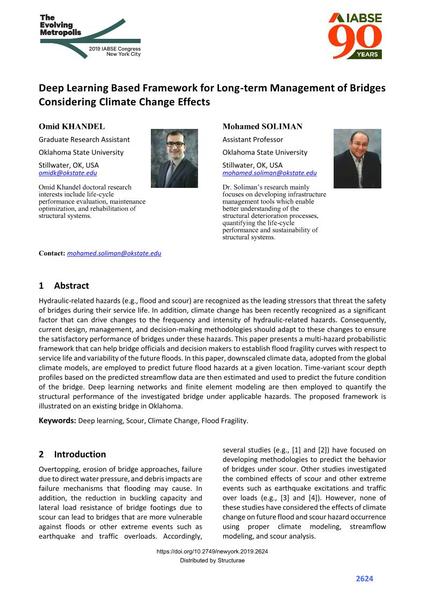Deep Learning Based Framework for Long-term Management of Bridges Considering Climate Change Effects

|
|
|||||||||||
Détails bibliographiques
| Auteur(s): |
Omid Khandel
Mohamed Soliman |
||||
|---|---|---|---|---|---|
| Médium: | papier de conférence | ||||
| Langue(s): | anglais | ||||
| Conférence: | IABSE Congress: The Evolving Metropolis, New York, NY, USA, 4-6 September 2019 | ||||
| Publié dans: | The Evolving Metropolis | ||||
|
|||||
| Page(s): | 2624-2628 | ||||
| Nombre total de pages (du PDF): | 5 | ||||
| DOI: | 10.2749/newyork.2019.2624 | ||||
| Abstrait: |
Hydraulic-related hazards (e.g., flood and scour) are recognized as the leading stressors that threat the safety of bridges during their service life. In addition, climate change has been recently recognized as a significant factor that can drive changes to the frequency and intensity of hydraulic-related hazards. Consequently, current design, management, and decision-making methodologies should adapt to these changes to ensure the satisfactory performance of bridges under these hazards. This paper presents a multi-hazard probabilistic framework that can help bridge officials and decision makers to establish flood fragility curves with respect to service life and variability of the future floods. In this paper, downscaled climate data, adopted from the global climate models, are employed to predict future flood hazards at a given location. Time-variant scour depth profiles based on the predicted streamflow data are then estimated and used to predict the future condition of the bridge. Deep learning networks and finite element modeling are then employed to quantify the structural performance of the investigated bridge under applicable hazards. The proposed framework is illustrated on an existing bridge in Oklahoma. |
||||
